
The true story behind The Winter Palace.
I’ve long been haunted by the idea of someone faithfully waiting for years for a loved one to return – not knowing whether the other person is dead, imprisoned, or worst of all, has forgotten them. How can we move on with life when our hearts are so bound to the past . . . when our memories are stronger and more meaningful than our day-to-day life today? You could call it in the Penelope Conundrum, after Odysseus’ wife who waited for his return during the long years of fighting and travelling home.
But an idea is not a novel. It was only when I learned about the abduction of Polish people by Russia in 1940 that my story began to take shape. Little known outside Polish communities, this episode during World War Two is another example of Stalin’s evil policies (as if another were needed). It also has a chilling similarity to the mass abduction of Ukrainian children by Russia today.
When Nazi Germany invaded Poland from the west in 1939, they had a secret pact with Russia to invade from the east, dividing the country between them. In need of labour, the Russians simply scooped up over a million people and transported them to Siberia to work in logging camps and mines. This was slavery pure and simple. Whole towns were emptied and their inhabitants forced into cattle wagons, then transported across the Urals to Siberia. Hundreds of thousands died from the freezing temperatures, sickness, or being worked to death. Back in Poland, their families had no idea what had happened to them. Then something extraordinary happened.
When Hitler invaded Russia the following year, the Poles became an ally of Russia alongside the British. The Polish slave workers were freed and Stalin allowed them to form an army under General Anders. They trekked for thousands of kilometres through Uzbekistan and Turkmenistan before arriving in Palestine in 1942. The Jewish Poles in the Anders Army promptly deserted to fight against the British for a state of their own, Israel. The remainder of the army joined British forces to eventually fight in Italy to drive out the Germans. After the war ended, Stalin’s Iron Curtain fell across Europe, and Poland was ruled by a Communist regime. The exiled Poles became a diaspora, scattered to Britain, Canada, India, Africa, and Australia.
I imagined a young couple parted in the midst of this turmoil. One goes to join his regiment to defend their homeland and is never heard from again. The other suffers the horrors of the German occupation until she finds a way to fight back. All the while she waits for him. The war ends and still she waits, for weeks, months, and then years. Would they ever meet again?
I had my story.
Image: Jean Jacques Lagrenée. Ulysses arrives at the Palace of Circé (1787). Musée de Picardie



